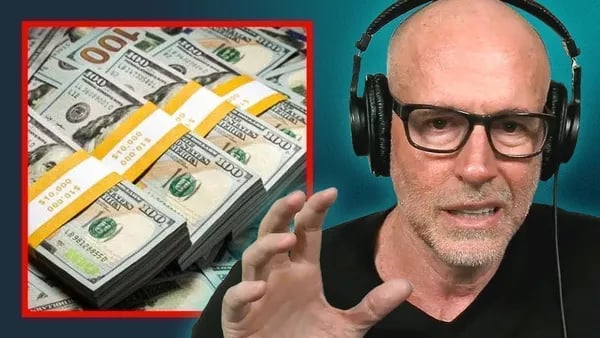Ever rolled around in a pile of quarters? I can’t say I have, but my Scottish father swears by it—and not just for fun. That’s a real story, not a metaphor, and it’s oddly telling: true financial security isn’t always glamorous. You might picture yachts, but my dad had a stack of laundry machines and the world’s lowest anxiety. In a world obsessed with net worth, what if real wealth is about sleeping well at night and sparing yourself the stress of ‘shoulds’? Let’s pull back the curtain on what it actually takes to build and keep your peace of mind—and maybe why you should reconsider aiming for the Hamptons in favor of coins in the couch.
What Is Financial Security? (And Why It’s Not the Hamptons)
When you think about the financial security definition, it’s easy to picture luxury cars, sprawling mansions, or weekends in the Hamptons. But real financial security isn’t about how much you earn or the status symbols you collect. It’s about something much simpler—and, honestly, much more powerful: having passive income that’s greater than your spending. In other words, your money works for you, not the other way around.
Let’s break this down with two real-life stories. First, consider the investment banker in Connecticut. He’s the kind of person you might assume is the very definition of “rich.” In a bad year, he brings in $3 million. In a good year, it’s $14 million. But here’s the catch: after taxes (a whopping 52%), alimony, child support, and the costs of maintaining a high-flying lifestyle—think Hamptons home, expensive cars, and all the trappings—he’s left with surprisingly little. The pressure to keep up appearances, to signal success, is enormous. And so is the stress. Despite his income, he saves very little and feels constantly on edge about money. As he puts it, money and the need for money is a huge source of stress for him.
Now, compare that to a very different example: a Scottish father who lives simply. His income? Around $52,000 a year, thanks to a Royal Navy pension, Social Security, and a dozen washing machines in trailer parks that quietly collect quarters. His expenses are about $48,000 a year. He doesn’t worry about losing his job or the next big bill. He enjoys his routines, collects his quarters, and lives with minimal financial stress. As one observer put it,
"His passive income is greater than his burn. That's the definition of rich."
So, what can you take away from these stories? The peace of mind that comes from knowing your passive income covers your living expenses is worth more than any status symbol. Research shows that financial security is less about the size of your paycheck and more about your ability to afford expenses, live comfortably, and save for the future. In fact, studies indicate that having enough passive income to overtake your “burn”—your total spending—marks a true turning point toward genuine financial freedom.
It’s easy to fall into the trap of thinking more income means more security. But if your lifestyle always grows to match (or outpace) your earnings, you’re never really secure. High earners can be “poor” if their spending outstrips their savings. On the other hand, someone with modest means but steady, reliable passive income can enjoy a sense of security—and freedom—that many high earners never achieve.
For your own financial checklist 2025, consider focusing on building passive income streams, keeping expenses in check, and prioritizing peace of mind over appearances. The real secret? Less stress, more freedom, and a life that isn’t dictated by the next paycheck or the latest trend.

Focus, Time, and the Power of Saying No (How to Actually Get There)
When you think about financial security benefits, it’s easy to picture a big savings account or a fancy car. But real security is about freedom—freedom from unnecessary obligations, freedom to choose how you spend your time, and freedom to say “no” without guilt. It starts with focus, builds with time, and is powered by the choices you make every day.
Find Your Focus: Ditch the Endless Side Hustles
One of the most powerful financial habits you can develop is focus. Instead of spreading yourself thin with endless side hustles, find what you’re naturally good at and double down. Research shows that becoming a top performer in a field with a high employment rate offers more stability and long-term growth than juggling multiple gigs. If your side hustles are dragging on, it might be time to rethink your main job. That extra effort invested in your core skill set often pays off more than the distraction of another side project.
‘Shoulds’ vs. ‘Wants’: Delete the Obligations
Financial security isn’t just about money—it’s about control. Barry Rosenstein’s “three bucket” theory sums it up: there are things you have to do, things you want to do, and things you should do. The real benefit of financial security?
"You can totally delete the should bucket."When you have your finances in order, you can stop doing things out of obligation and focus on what truly matters to you. That’s liberating, and it’s a key part of redefining what it means to be rich.
Time: Your Most Valuable Asset
Time is the secret weapon in building wealth. Most people underestimate how quickly life moves, but the earlier you start saving and investing, the more you benefit from compound interest. Even small, consistent contributions can add up to life-changing amounts. For example, if you put away just $1,000 at age 25 and let it grow at an 8% annual return, it could be worth $10,000, $20,000, or even more by the time you’re 55. As the saying goes:
"The power of compound interest is amazing."
Consider this: instead of spending $62,000 a year on private school tuition from ages 4 to 18, investing that money at an 8% return could give your child over $5 million by age 35. That’s the magic of starting early and letting time work for you.
Build Financial Habits That Last
- Focus on your main skill or career—aim for the top 10% in your field.
- Practice saying “no” to obligations that don’t align with your goals.
- Start saving and investing as early as possible, even if it’s just a small amount.
- Maintain an emergency savings fund with 3–6 months of living expenses to protect against life’s surprises.
Research indicates that building financial security is less about chasing every opportunity and more about developing productive, focused habits. Time and discipline are your greatest allies—use them wisely, and you’ll find that financial security is within reach, not just a distant dream.

Stoicism, Diversification, and Avoiding the ‘Hero’ Trap
When you think about building financial security, it’s easy to imagine that the secret is finding the next big thing or making a bold, all-in bet. But research and real-world experience show that lasting wealth isn’t about heroics—it’s about smart financial behavior, resilience, and a healthy dose of humility. This is where diversification strategies and stoicism come in, forming the backbone of any solid financial checklist for 2025.
Some Things Are Out of Your Control
Markets have a mind of their own. Even if you pour your heart, soul, and capital into an investment, outside forces can turn the tide in an instant. It’s not about how “awesome” you are or how hard you work—sometimes, luck and timing simply aren’t on your side. That’s why it’s crucial to focus on what you can control: your spending, your saving, and your overall financial resilience.
Spending decisions are always within your grasp. Avoiding lifestyle inflation and unnecessary luxury purchases can do more for your long-term security than chasing risky returns. Studies indicate that those who consistently save and manage their expenses report higher financial confidence and peace of mind, regardless of market swings.
Diversification: Your Financial Kevlar
There’s a common myth that spreading your bets is a sign of weakness or lack of conviction. In reality, diversification is your Kevlar. By limiting any single investment to no more than 3% of your net worth, you protect yourself from catastrophic losses. If one bet goes to zero, it stings—but it won’t knock you out.
"Diversification is your Kevlar."
Consider this: in 2008, a single concentrated investment turned $10 million into $3 million of debt overnight. The emotional and mental toll was enormous. Now, with a diversified approach, even a total loss in a promising company is just a bruise, not a fatal blow. You don’t need to be a hero or find the one-in-a-million winner. As the saying goes:
"You don't need to be a hero. You can buy the whole haystack."
Research shows that the pain of a big loss far outweighs the fleeting joy of a rare, outsized win. Diversification strategies not only protect your finances but also your well-being, allowing you to weather setbacks and stay in the game for the long haul.
The Full-Person Project: Character and Allies Matter
Financial security is more than just numbers. It’s a full-person project. Your reputation, trustworthiness, and ability to build genuine relationships are just as important as your portfolio. Most self-made wealthy individuals didn’t climb to the top by stepping over others. In fact, studies suggest that strong networks and a reputation for integrity attract more opportunities and allies, which are crucial for long-term financial resilience.
Building wealth slowly, with patience and discipline, is the proven path. Focus on what you can control, diversify to protect yourself, and remember that your character is your greatest asset. Allies and opportunities flow to people who are trusted, not just driven.

Wild Card: Would You Choose Quarters Over Cannes? A Hypothetical Thought Experiment
Imagine you’re standing at a crossroads, holding a financial checklist for 2025 in one hand and your child’s future in the other. The question is simple, but the answer is anything but: Would you send your child to an elite private school, or would you choose a public school and invest the $62,000 annual tuition—every year, for 14 years—in a low-cost ETF? If you stick with the disciplined investing, research shows you could end up with around $5.3 million by the time your child turns 35, assuming an average 8% return. It’s a wild card scenario, but it’s not just a thought experiment. For many families, this is a real-world dilemma that challenges what we think of as “essential” expenses.
Let’s be honest—financial security often requires making choices that don’t always look impressive from the outside. Opting for public school over a prestigious private institution might raise eyebrows, but it can also offer peace of mind and long-term financial security benefits that are hard to ignore. In fact, studies indicate that the best school for kids is often the one closest to home, not necessarily the one with the highest price tag. The time saved on commuting can be reinvested into sleep, play, and study—things that matter just as much, if not more, than a school’s reputation.
But what if you’re wrong? What if, despite your best intentions, your child doesn’t get into the “right” college, or doesn’t land the dream job? What if they struggle to buy their first home or can’t replicate the lifestyle you hoped for them? These are real fears, and they’re not easily dismissed. Yet, as you work through your financial goals, it’s worth asking: Are you chasing dreams you truly want, or just running from the ‘shoulds’ that society has placed on you?
There’s a powerful quote that sums up this dilemma:
"I would just love to have a banner that says public school or 5.3 million."It’s a reminder that sometimes, the most radical financial decisions are the ones that offer the greatest peace of mind. When you strip away the pressure to impress, you open the door to a life defined by intentional choices, not just prestige.
Research shows that many so-called “essential” expenses are actually optional. This realization can be liberating. It allows you to rethink your financial priorities and focus on what truly brings security and happiness. In 2025, more Americans are reporting improved financial security, thanks in part to strong market performance and wage growth. Yet, debt and limited savings remain challenges for many. Building financial security isn’t about following the crowd—it’s about making choices that align with your values and support your long-term well-being.
In the end, redefining what it means to be “rich” is about more than numbers on a balance sheet. It’s about having the freedom to choose, the confidence to question, and the peace of mind that comes from knowing you’re living life on your own terms. Whether you choose quarters or Cannes, the real win is in making the decision that’s right for you and your family.




